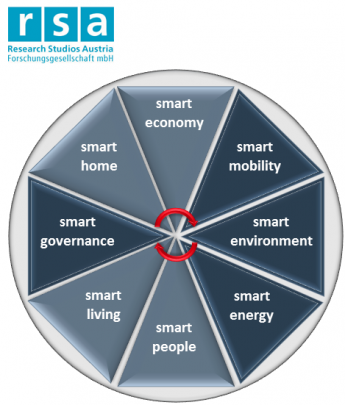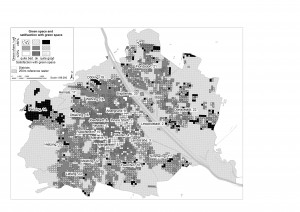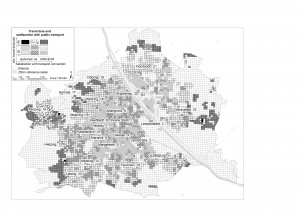A future-oriented spatial planning has to face the challenges of integrating ecological, social, and economic aspects of living. This is often seen as a principle to also guarantee a certain level of Quality of Life (QoL). To assess close and extended living environments, indicators and measures are derived by using methods based on Geo-Information-Systems (GIS). To evaluate aspects of Quality of Life surveys and questionnaires on e.g. residential satisfaction can be used – if available. With this opportunity perceived Quality of Life of the residential population is compared with actual reality – qualitative data are opposed to quantitatively measured parameters. Given interview answers concerning e.g. the satisfaction with the accessibility to green spaces or public transport qualities can thus be compared with derived GIS-based spatial indicators. A GIS-based analysis allows for visualizing results and produces an innovative, spatially explicit view on subjective and objective description of QoL.
From a scientific point of view, such work contributes to the under-developed research field of environmental psychology coupled with geographical analysis.
For the city of Vienna, Austria a comparison between objective and subjective Quality of Life measures was done in 2014. For this case study two fundamental QoL dimensions were examined: public transport and green space availability. Areas of general agreement discordance are mapped within a geographic information system and characteristics of residents living in places with a mis-match between satisfaction and GIS-derived measurements are assessed. Results show that while the objective and subjective measurements are largely in congruence with one another, some variations do exist, thus stressing the spatial heterogeneity in residential QoL perceptions.
For this website two visualization have been selected: The juxtaposition of green spaces availability and satisfaction with green spaces is depicted in the left picture below; the relation between travel time to the city centre and the satisfaction with public transport is shown on the right picture.
Other relevant projects:
- QoL analyses in the City of Salzburg in cooperation with Z_GIS
- QoL analyses in the City of Salzburg in cooperation with Prof. A. Keul, Department of Psychology @ University of Salzburg
- Project in cooperation with the city government of Vienna: Contribution to a digital urban development system – the development of spatial indicators with GIS-based analytical methods (related publication)
Contact persons @ iSPACE:
- Dr. Thomas Prinz: thomas.prinz@researchstudio.at
- Dr. Eva Haslauer: eva.haslauer@researchstudio.at


